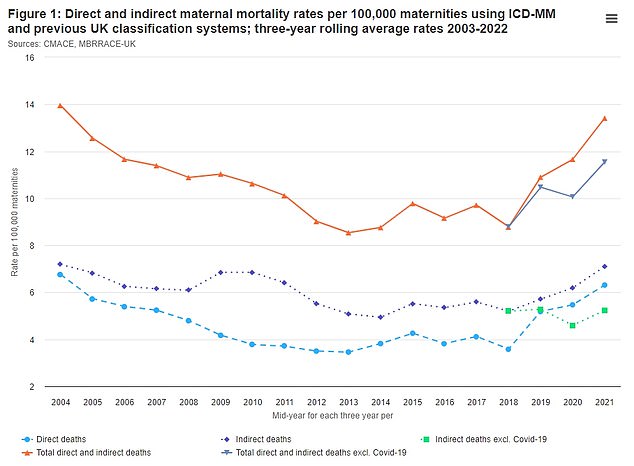Mothers who have an epidural during labor have a 35 percent lower risk of potentially life-threatening complications, research shows
Epidurals can reduce the risk of serious complications for mothers during childbirth, according to a study of more than half a million Brits.
Those who received the pain relief were less likely to experience sepsis and heart attacks during and in the weeks after delivery.
Making epidurals more available during labor could help reverse the growing trend of maternal deaths and injuries in Britain, the findings suggest.
Researchers studied 567,216 women in labor in Scotland’s NHS hospitals between 2007 and 2019 who gave birth vaginally or by unplanned caesarean section.
Of these, 125,024 women received an epidural, which is administered via an anesthetic injection in the back to block the pain.
Those who received the pain relief were less likely to experience sepsis and heart attacks during and in the weeks after delivery. Making epidurals more available during labor could help reverse the growing trend of maternal deaths and injuries in Britain, findings suggest
The study, led by the University of Glasgow and the University of Bristol, found that an epidural reduced the risk of potentially life-threatening conditions by 35 percent.
They were also more effective in women who had given birth prematurely or who had previous medical or obstetric conditions.
Researchers say their findings, published in The BMJ, suggest that ‘expanding access to epidural analgesia for all women during labour, and especially for those most at risk, could improve maternal health’.
Lead author Professor Rachel Kearns from the University of Glasgow said: ‘This finding underlines the need to ensure access to epidurals, especially for those who are most vulnerable: women facing greater medical risks or giving birth prematurely.
‘By widening access and improving awareness, we can significantly reduce the risk of serious health problems and ensure safer birth experiences.’
It comes the week after a parliamentary inquiry found maternity care needed a radical shake-up, with women needlessly suffering lifelong trauma after giving birth.
MPs heard expectant mothers are routinely mocked or ignored by doctors and midwives, who treat them as an ‘inconvenience’ and deter them with inadequate pain relief.

It comes the week after a parliamentary inquiry found maternity care needed a radical shake-up, with women needlessly suffering lifelong trauma after giving birth. MPs heard expectant mothers are routinely mocked or ignored by doctors and midwives, who treat them as an ‘inconvenience’ and deter them with inadequate pain relief

Earlier this year, a report from the Oxford-led MBRRACE-UK (Mothers and Babies: Reducing Risk through Audits and Confidential Inquiries) showed that women are dying during childbirth at the same rate as 20 years ago. Between 2020 and 2022, approximately 293 women died during pregnancy and within six weeks of giving birth
Earlier this year, a report from the Oxford-led MBRRACE-UK (Mothers and Babies: Reducing Risk through Audits and Confidential Inquiries) showed that women are dying during childbirth at the same rate as 20 years ago.
Between 2020 and 2022, approximately 293 women died during pregnancy and within six weeks of giving birth.
The latest research found cases of serious complications during childbirth almost doubled in the following six weeks in Britain between 2009 and 2018.
This was largely attributed to the increase in the number of older mothers and obesity. Although generally safe, epidurals carry some risk and side effects have been reported, including headaches, pain and a drop in blood pressure, which can sometimes affect the baby.
Professor Deborah Lawlor from the University of Bristol said it is important that women and their partners have control over their treatment during pregnancy.
She added: ‘It is also important that women who would benefit from an epidural to avoid becoming seriously ill are given easy-to-understand information to help them make an informed decision.’
